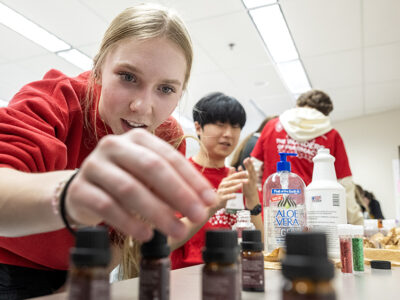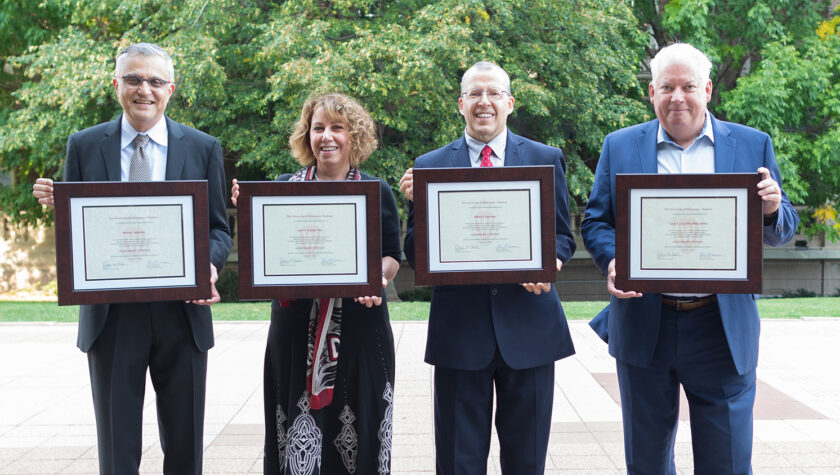
13
September

The School’s highest annual award celebrates alumni and friends for contributions to academia and industry
By Katie Ginder-Vogel
The University of Wisconsin–Madison School of Pharmacy’s highest annual honor — the Citation of Merit — is a tradition dating back nearly seven decades. The Citations were established to celebrate distinguished alumni and friends of the School who have shaped pharmacy practice, research, and education nationally and internationally, as well as right here at the School.
“Naming the School of Pharmacy’s Citation of Merit honorees is a humbling process that gives us the opportunity to see the breadth and depth of impact that friends and alumni of the School have truly made on the field of pharmacy and pharmaceutical research,” says Dean Steve Swanson. “We are proud to celebrate the achievements of our 2021 awardees, who are a stellar group with proven and continued national influence.”
The four 2021 honorees are:
- Dan Luce, president and co-founder of CLM Pharmacy Advisors
- Bill Doucette, professor and head of the Health Services Research Division at the University of Iowa College of Pharmacy
- Mehran Yazdanian, vice president of specialty R&D operations and site head of R&D West Chester, Teva Pharmaceuticals
- Jayne Hastedt, managing director of JDP Pharma Consulting
In an October dinner and awards ceremony, the School will honor our 2021 recipients in tandem with the 2020 awardees: Bruno Hancock, Susan Sutter (BS ’78), Greg Higby (BS ’80, PhD ’84), and Nivedita (Nita) Pandit (MS ’78, PhD ’80).
Dan Luce (BS ’81)
Retail pharmacy industry innovator
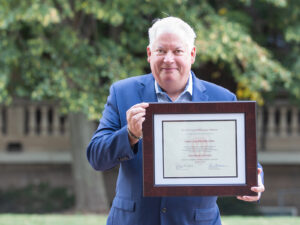
Acting, pre-med, chemical engineering — Dan Luce was considering many options when he enrolled at UW–Madison. Then he met several pre-pharmacy students and decided to combine his interests in science and medicine and apply to the School of Pharmacy.
After graduating from the School, Luce worked at an independent pharmacy, then joined the staff of the Milwaukee County Mental Health Complex. He realized he wanted to get into management and leadership — and he still had dreams of acting — so he decided to head to California.
“I packed up my red BMW 320i and took a couple months to traverse the country, stopping to see friends and windsurfing along the way,” he says.
When Vons Pharmacy offered him a leadership position, Luce set aside his acting aspirations and focused on his full-time job running the territory that included Las Vegas, San Diego, Fresno, and Santa Barbara for two years.
“At 28, I ran operations for 45 to 50 locations,” Luce says. “Vons was really growing, so I had to be a jack of all trades, handling hiring, IT, operations, regulatory, and communications. I learned so much.”
After four years in Southern California, Luce returned to Wisconsin and his extended family, landing a position at Walgreens. His experience was bolstered by eight years of service to the Wisconsin Board of Pharmacy from 1996 to 2004, including two terms as chairman, where he was immersed in rule writing and the regulatory process. After seven years at Walgreens, Luce carved out a niche in regulatory affairs in Walgreens’ corporate office. He also got to fold in his penchant for acting, appearing in 50 Walgreens training videos and 18 episodes of WGN’s weekly “Health Corner” show.
“To look at the past list of inductees — the who’s who of Wisconsin pharmacy — and then to see your own name added to that esteemed list is kind of surreal. These are the people I’ve looked up to my whole career.”
—Dan Luce
Through his three decades with Walgreens, Luce helped design a strategy for the retail pharmacy industry to allow shared services, like remote order entry across state lines, so that if one Walgreens store was behind and another store wasn’t busy, they could help the busier store.
“Walgreens was the only place with the technology, so I designed a shared service strategy for the whole industry,” Luce says. “That was my baby. It took about six years to get workload balancing well implemented.”
Luce was a senior corporate manager with Walgreens when Hurricane Katrina hit, and over 90 Walgreens stores were flooded. Walgreens held a meeting in the corporate office to decide what to do with soaked inventory and how to fill scripts. Luce spoke up against charging patients for medications that might be soaked or ruined and suggested giving the prescriptions away for free, with the disclaimer that water damage could have made them less effective, but at least patients would have something until regular pharmacy services could be restored, which could take weeks.
“It was one of those times when you think, I made a decision that affected the entire population of New Orleans with prescriptions at Walgreens,” he says. “They got meds that someone else might have said to destroy.”
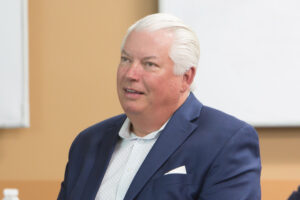
The next step was to find a way to allow Tennessee Walgreens stores to fill scripts for flooded Louisiana stores. The company received special permission from state pharmacy boards in areas impacted by the hurricane to allow pharmacists outside Louisiana to fill prescriptions.
“Walgreens truly was a family, and everyone helped each other out,” he says. “The company was good about responding to disasters, and if anybody needed something, you helped them.”
Luce eventually became the vice president of pharmacy affairs in Walgreens’ Government and Community Relations department, serving as the primary liaison with boards of pharmacy and state legislatures. His role focused on implementing new technologies that help pharmacists focus on patient care.
“I’m proud of making a difference and being the national leader in regulatory strategy,” he says.
After 33 years at Walgreens, Luce founded consulting firm CLM Pharmacy Advisors in 2020 with Carmen Catizone, the former executive director/CEO of the National Association of Boards of Pharmacy, and Tom Menigan, the former executive vice president and CEO of the American Pharmacists Association (APhA).
Luce has left his mark on the national pharmacy landscape, as a former member of the APhA Board of Trustees and the APhA Government Affairs Committee, plus a four-year term on the APhA Foundation Board of Directors. Closer to home, Luce was a founding member of the Pharmacy Society of Wisconsin (PSW) and served on the PSW Chain Advisory Board.
Throughout his career, Luce has maintained a close connection with the School of Pharmacy and has sat on the School’s Board of Visitors for the last 19 years, making him one of the longest-serving members in history.
“I made a decision that affected the entire population of New Orleans with prescriptions at Walgreens. They got meds that someone else might have said to destroy.”
—Dan Luce
Luce also often serves as an alumni judge for the School’s SHARx Tank competition for PharmD student entrepreneurs, where he uses his decades of experience in retail pharmacy to advise student pharmacists how to develop their ideas into a sustainable business.
Despite his numerous achievements, Luce says the Citation of Merit feels humbling.
“To look at the past list of inductees — the who’s who of Wisconsin pharmacy — and then to see your own name added to that esteemed list is kind of surreal,” he says. “These are the people I’ve looked up to my whole career.”
Bill Doucette (BS ’83, MS ’88, PhD ’93)
Empowering community pharmacists
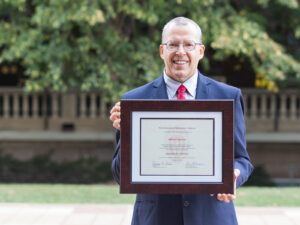
“In my work, I try to be on the cutting edge,” says Bill Doucette, a professor of pharmacy at the University of Iowa. “I don’t want to be the tenth person looking at the problem.”
His research is focused on how pharmacists can have the greatest positive impact on patient health. He regularly speaks with community pharmacists about their work and challenges to find new ways to offer or alter services to ease their workload while enabling them to practice at the top of their license.
In recognition of his innovative and impactful research into patient care and pharmacist-physician collaboration — resulting in more than 175 peer-reviewed articles — Doucette just received the 2021 Paul R. Dawson Award for Excellence in Patient Care from the American Association of Colleges of Pharmacy. In 2020, he earned the Wiederholt Prize for best paper published in the Journal of the American Pharmacists Association and in 2019 won the APhA’s Clinical Research Paper Award.
Joining his shelf of accolades, Doucette’s 2021 Citation of Merit from the School of Pharmacy makes him pause and reflect on his career’s impact.
“It warms my heart to be recognized and receive a Citation of Merit from where I learned how to do science and research and disseminate it,” he says. “It’s humbling to reflect on where I started.”
While a student in the School’s Social and Administrative Sciences in Pharmacy program (now Health Services Research in Pharmacy), Doucette studied under Professor Joseph Wiederholt, a prolific researcher and namesake of the Wiederholt Prize. Wiederholt was known for using the phrase, “Let’s go to Neptune,” to encourage students to think outside the box.
To this day, Doucette uses that advice to pursue ways for pharmacists to improve care. One such creation is the Drug Adherence Workup, or DRAW tool, which walks pharmacists and patients through specific questions to determine why patients aren’t taking their medications.
“It warms my heart to be recognized and receive a Citation of Merit from where I learned how to do science and research and disseminate it.”
—Bill Doucette
Doucette is currently involved in an ongoing Centers for Disease Control-funded project with the Iowa Department of Public Health, focused on how pharmacists and physicians can collaborate with patients to control high blood pressure, high cholesterol, and other conditions that influence cardiovascular health. Last year, they piloted a self-measured blood pressure monitoring program with nine pharmacies.
During the 10-week program, one pharmacy helped identify a patient who was having an aortic aneurysm.
“The pharmacist saw irregularities in the patient’s blood pressure readings, and the patient went to their cardiologist, who recognized an aortic aneurysm and send them for surgery at the Mayo Clinic,” says Doucette. “The pharmacist having the patient’s blood pressure readings saved them from a rupture.”
The pilot found that patients improved or maintained their health after the program, so they will repeat it this year with a goal of 15 pharmacies and an additional program: a statewide protocol on nicotine replacement therapy.
Doucette has done similar studies on pharmacist-driven interventions for diabetes, in which he found that pharmacists can boost patient outcomes by sharing feedback with physicians, reviewing patients’ medications, and assessing patients’ beliefs about health and medication.

Doucette and his collaborators are currently working on a manuscript to share their newly created tool called the Iowa Medication Complexity Score.
“We developed a measure that assigns a regimen complexity score to patients,” he says. “The idea is that you could sort your patients by complexity and provide different services and service intensity for each category.”
For example, pharmacists could monitor low complexity patients at the time of dispensing, while patients at the highest level might receive a more comprehensive medication review.
“Monitoring by score in one pharmacy for nine months, we identified 10,000 problems among 1,000 patients 50 and older that needed the pharmacist’s attention,” he says.
Doucette helped evaluate a value-based pharmacy program with Blue Cross Blue Shield, in which pharmacists receive payments for performance metrics, like drug adherence and blood pressure monitoring.
“If pharmacists are paid for better disease management, that would offset pharmacy costs for providing those services,” explains Doucette. “From an insurer perspective, the study showed that patients in the program had 3.5-4.5 percent lower total costs.”
Every five years, Doucette collaborates with his School of Pharmacy classmates Dave Mott (BS ’88, MS ’92, PhD ’95), the William S. Apple Distinguished Chair and professor in the School’s Social and Administrative Sciences Division, and Jon Schommer (BS ’85, PhD ‘92), a professor at the University of Minnesota College of Pharmacy, on the National Pharmacist Workforce Trends Report. The most recent report came out in 2019, but national pharmacy associations are interested in an interim report to get a clearer sense of how the pandemic has impacted the profession.
“Things we’ve worked on over the years are not problems anymore. It’s exciting to see that evolution and have played a small role in it.”
—Bill Doucette
“We know there was lots of stress,” says Doucette, who is still considering the request. “The workload went up with the addition of COVID-19 vaccines and alternate prescription pickup methods, and staffing was an issue as pharmacy employees got sick or had to quarantine.”
Since Doucette started his career nearly 30 years ago, he’s seen a broad transformation of the role of pharmacists, which now includes vaccinations, medication synchronization, nicotine replacement, naloxone dispensing, and blood pressure monitoring.
“Things we’ve worked on over the years are not problems anymore,” he says. “It’s exciting to see that evolution and have played a small role in it.”
Mehran Yazdanian (MS ’88, PhD ’90)
Drug development leader
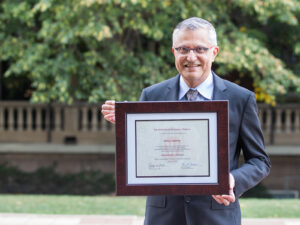
Born in Iran, Mehran Yazdanian attended high school in Geneva, Switzerland, and knew he wanted to go to college in the U.S. He chose UW–Madison based on its national ranking for biochemistry and arrived on campus in 1982.
He credits his first class, Chemistry 109, with setting the stage for his illustrious career in drug development.
“I was fortunate to have Professor Hyuk Yu as my freshman chemistry instructor, the first class of my first day of college,” says Yazdanian. “He turned out to be a pivotal figure.”
Yazdanian worked in Yu’s chemistry lab beginning in his junior year, which became a bridge to the School of Pharmacy.
Yu collaborated with School of Pharmacy Professor George Zografi, and as Yazdanian learned more about Zografi’s research on monolayers of fatty acids at air/water interfaces, he became intrigued, and decided to go to graduate school in pharmaceutics to study with Zografi.
“The School of Pharmacy has a good environment for graduate students,” he says. “The faculty are open to sharing and helping.”
Zografi emphasized the importance of a strong foundation in his graduate students’ scientific knowledge and encouraged them to explore a breadth of research areas. Yazdanian found himself fascinated by studying the effect of cations, ions with positive charges, on fatty acids — an interest that would stick with him for decades to come.
Out of three job offers he received upon graduation, Yazdanian chose Merck for its strong reputation. Yazdanian has studied ionic interactions throughout his 35-year career, which has gone through all aspects of pharmaceutical development.
“UW–Madison and the connections that I have made have given me so many opportunities throughout my life and career, and I am very honored to be recognized and receive this Citation of Merit.”
—Mehran Yazdanian
“At my first job at Merck, I had a choice to either develop formulations for animals or for humans,” he says. “I chose the former, and it was fascinating. I learned a lot about drug delivery for topical, transdermal, and parenteral applications in a very short time.”
Three years later at the Land O’Lakes Conference hosted by the School of Pharmacy’s Division of Pharmacy Professional Development, Yazdanian ran into Jim Wright, who had been a professor at the School when Yazdanian was a graduate student and then worked at Boehringer Ingelheim Pharmaceuticals, Inc. (BI). Wright shared his plan to set up a lab at BI and study cellular permeability to predict oral absorption and asked Yazdanian to interview.
Yazdanian ended up heading up the Physical Pharmaceutics section at BI, where he spent the next 11 years before moving to Cephalon to support drug discovery and lead a product development group in France.
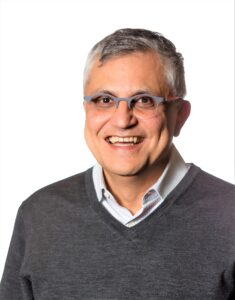
“I led an integrated pharmaceutics department at Cephalon, comprised of analytical and formulation development scientists, as well as manufacturing engineers supporting product development,” says Yazdanian. “It was the most fantastic opportunity. I got to spend time in Paris and doing interesting work.”
Yazdanian describes his experience at Cephalon as the best time of his career, and he held the role for eight years. In 2011, Teva Pharmaceuticals acquired Cephalon, and Yazdanian stayed on. He currently leads chemistry, manufacturing, and controls project managers to implement strategies to streamline the process for the development of innovative biologicals and biosimilars to reach regulatory submission.
Yazdanian stays closely connected with School of Pharmacy colleagues and gathers with other graduates of Zografi’s lab every five years. He also serves as an instructor in the School’s new Applied Drug Development master’s degree program and on the Advisory Board for the Zeeh Pharmaceutical Experiment Station. To further support the Zeeh Station, Yazdanian has contributed to the George Zografi Educational Advancement Fund, which supports one graduate student employee each year.
“As a graduate of the School of Pharmacy, it’s a great pleasure to contribute to the Zeeh Station and ensure its continued success, not only in providing high-quality services to the pharmaceutical industry and academic labs, but more importantly, in providing a venue for students to put to practice what they learned in their courses,” he says.
He’s currently based in Philadelphia, near the Community College of Philadelphia, where he has also established a fund to combat food insecurity among students.
“As a graduate of the School of Pharmacy, it’s a great pleasure to contribute to the Zeeh Station and ensure its continued success.”
—Mehran Yazdanian
“Getting a quality education and establishing connections to utilize my knowledge and experience has been essential to my success in both life and career,” he says. “I admire the fact that people make the effort to go to school, and I hate the thought of them going on an empty stomach.”
Across his accomplished career, Yazdanian says he’s most proud of the students he has mentored and their successes.
“Important themes in my career are connections, mentorship, and giving,” says Yazdanian. “UW–Madison and the connections that I have made have given me so many opportunities throughout my life and career, and I am very honored to be recognized and receive this Citation of Merit.”
Jayne Hastedt (MS ’88, PhD ’90)
Pioneer and pillar in drug delivery
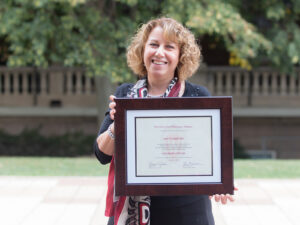
After Jayne Hastedt earned her associate degree in chemical engineering in Connecticut, she went right to work at Boehringer Ingelheim.
“While I was there, three amazing people came in the door: Nita Pandit (MS ’78, PhD ’80), Lynn Van Campen (MS ’79, PhD ’81), and Jim Wright (MS ’77, PhD ’83),” says Hastedt.
All three mentored Hastedt, and Wright gave Hastedt and another colleague weekly lunchtime tutorials in physical pharmacy and drug delivery, release rates, and understanding dissolution profiles.
“I feel so honored and lucky because Jim set me up with a research pathway that I really enjoyed,” she says.
Inspired by the three Badger pharmacy grad colleagues and a growing love for drug delivery, Hastedt decided to go to graduate school at the UW–Madison School of Pharmacy.
When Hastedt got to Madison in 1985, she worked with Professor Ron Burnette on iontophoretic drug delivery. Then, Wright accepted a faculty position at UW and became Hastedt’s advisor.
“He was doing more physical in vitro transport type studies, and we had started doing some of this work at Boehringer,” Hastedt says. “We were looking at dosage forms and dissolution and release, so my master’s degree focused on dissolution and percolation theory and drug transport.”
When Wright returned to industry, Hastedt began her PhD in Professor George Zografi’s research group.
“Any other advisor would say, ‘Switch to my research area,’ but George said, ‘Continue doing your research because it’s really important for you to go deeply into an area of research for your doctorate,’” says Hastedt. “George was very supportive and guiding.”
“I enjoy it because the technology and drugs out there right now are so exciting, and I get to touch them and figure out how to develop them and get them to patients who need them.”
—Jayne Hastedt
After graduate school, Hastedt went to work in the pharmaceutics department at Glaxo in North Carolina. Then, Van Campen called.
“She said, ‘I’m working at this startup in San Carlos, Inhale Therapeutic Systems, doing pulmonary drug delivery, using a novel manufacturing process and a novel drug delivery device to deliver insulin to the lung for treatment of diabetes,’” Hastedt says. “They were delivering insulin systemically using the lung as a portal, and no one had ever done this before. I came out and interviewed.”
She landed the job and worked there for several years until her dream job opened up with Alza. She remembered Zografi telling her about Alza founder Alejandro Zaffaroni presenting the transdermal patch concept at the Land O’ Lakes Conference.
“Alza was the first drug delivery company ever,” she says. “They developed transdermal patches. It was revolutionary what Alza did for the industry.”
When Alza was 40 years old, parent company Johnson & Johnson decided to shut down the site, on which Google’s headquarters sit today. Hastedt, who was the chemistry, manufacturing, and controls site head and managed research and development for transdermal and osmotic dosage forms, was put in charge of an orderly shutdown. After that, she decided to start her own consulting firm, focused on pulmonary drug delivery.
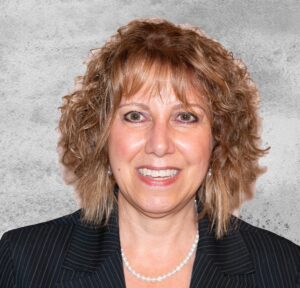
“That is really one of the most challenging dosage forms out there,” she says. “But that’s why I love it.”
Hastedt works with startup companies all around the world and matches new technologies and products with product development teams and laboratories. She has even hired Zografi as a consultant from time to time for his expertise.
“I enjoy it because the technology and drugs out there right now are so exciting, and I get to touch them and figure out how to develop them and get them to patients who need them,” she says.
Hastedt believes we are on the cusp of identifying treatments and cures for life-threatening diseases.
“The adeno-associated viral vectors I’ve been working with are potential cures,” she says. “These molecules are not your standard simple small molecules. They really test your technical and problem-solving abilities.”
Hastedt says Zografi taught her to be humble and respectful of others, which is key to her work.
“In the pharma industry you cannot develop a drug in a vacuum without collaboration across a ton of different disciplines,” she says. “You’ve got to work with everyone and be respectful, be humble, admit you don’t know everything, and jump into things even when you’re uncomfortable.”
In addition to her consulting firm, Hastedt has been working with a group of experts from academia, industry, and the U.S Food and Drug Administration to develop a biopharmaceutics classification system for inhaled pulmonary drugs, currently named the Inhalation BCS.
“This makes me feel like something I’ve done along the way, by accident or on purpose, has been useful to others,” she says. “It’s totally humbling and wonderful.”
—Jayne Hastedt
Hastedt values her longtime connections to the School of Pharmacy and serves on the advisory board for the Zeeh Pharmaceutical Experiment Station, which she consulted with Van Campen about when it was first launched. She also helped develop a course in the School’s Applied Drug Development master’s degree program. Staying involved in teaching with the School’s Division of Pharmacy Professional Development has strengthened her resolve to continue learning.
“Lifelong learning leads to lifelong problem solving,” she says. “There’s always something new to explore – that’s what makes life interesting.”
Receiving the School of Pharmacy’s 2021 Citation of Merit makes Hastedt feel like her career has truly been impactful.
“This makes me feel like something I’ve done along the way, by accident or on purpose, has been useful to others,” she says. “It’s totally humbling and wonderful.”






